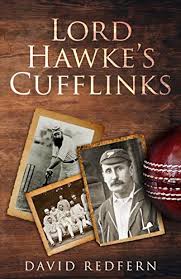Lord Hawke’s Cufflinks
Martin Chandler |Published: 2019
Pages: 227
Author: Redfern, David
Publisher: Private
Rating: 2 stars

The back cover of Lord Hawke’s Cufflinks contains a synopsis that I cannot improve on. The author describes his book as a comic novel with a cricketing background, set on an Ashes tour of Australia, where everything that could go wrong, does.
The England team’s manager, Charles Ridley Spode, is suspected of stealing Lord Hawke’s historic cufflinks from the Lord’s museum before leaving England. Rupert Sherbourne, the increasingly panic stricken head of the ECB, sends his museum security officer, Flint, to Australia to try to retrieve the cufflinks.
Flint goes undercover in the Barmy Army, disguised as a giant leek. As Sherbourne’s pursuit of Spode becomes increasingly desperate, England captain Potter is drawn into the fray. Meanwhile the Australian team have devised a cunning plan, developing an almost magical ability to produce reverse swing at will, leaving the English players puzzled and suspicious.
As Flint closes in on an unsuspecting Spode, the series finally erupts in a dramatic fifth test at Sydney.
Cricket fiction is not my bag but, the author having taken the trouble to send a review copy of his book, I thought I should at least make the effort. Having read Lord Hawke’s Cufflinks I will say now that it has not changed my view of the genre, although that is a purely personal point of view.
The story itself is not a credible one, although I am not suggesting that being such is a prerequisite to a satisfactory novel. To be fair to the author his plot is a clever one, well worked and, whilst it may not have captured my imagination sufficiently for me to want to want to exceed my target of reading a dozen or so pages at each sitting, it was sufficiently entertaining to get me to the end.
Is the book a comical one? I think that is perhaps pushing it, although there were a number of occasions when the narrative caused me to smile. Humour of course has many facets, and I can see that others may well find some of the situations more amusing than I did.
I assume that the key to success with this sort of book it is to ensure that the progress of the narrative is not predictable. In that I believe the author does succeed because, as I say, his story is an original one which does take his reader in unexpected directions. At the other end of the scale in my, admittedly limited, experience novelists can fall into the trap of allowing their plots to become too complicated for their own good. I did at times fear that may happen here, but in the end never did lose my understanding of how the story was unfolding.
The quality of Redfern’s writing is not bad either. Generally the grammar is acceptable and the book is a readable one, although there are one or two grating tautologies. One in particular that I can recall is to the left, in the corner, standing stock still, was a large, motionless man. Those who disapprove of infinitives being split will also find the occasional cause for irritation.
Is Lord Hawke’s Cufflinks recommended? I can’t say in all honesty that I enjoyed it, but then I was almost certainly never going to. For anyone who enjoys cricket fiction, and to whom the quoted description appeals it might well be worth a read. For this reviewer however I’d rather read about a real Ashes series every time, even the ones England lose 5-0.






Leave a comment